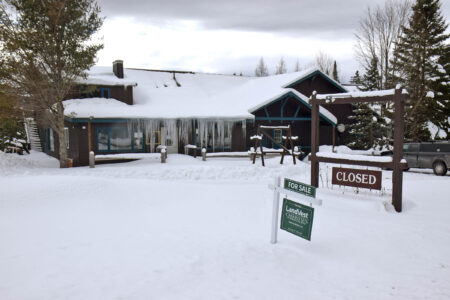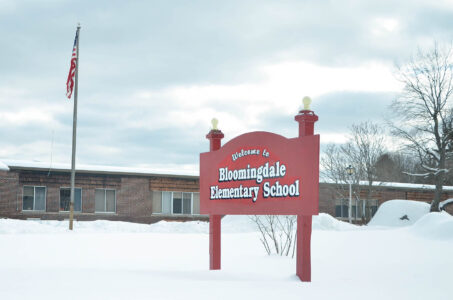Franklin County land bank moving forward
Land bank could flip vacant properties for housing, business
SARANAC LAKE — Franklin County is nearly completed crafting a new tool to fix up blighted and vacant properties — it has state approval to start New York’s 27th land bank and is applying for a nonprofit designation this week.
“I have to tell you, we are beyond excited,” county Manager Donna Kissane said on Thursday.
Franklin County is the first county in the North Country to get approval for a land bank, she said. There is one land bank currently in the North Country — the city of Ogdensburg’s land bank was approved in 2018.
A land bank is an entity separate from the county, which works with the county to take properties that have years of delinquent taxes and are run-down or vacant and transfer them to the land bank to renovate and sell to private people for housing, commercial property or a mix of both.
These properties could be safety hazards, eyesores or empty prime real estate that could be used for business or housing.
Usually, these properties would go up for sale at county tax foreclosure auctions but county Legislator Justus Martin said there are benefits of a land bank versus the typical tax foreclosure auction.
“The problem sometimes with tax sales is that the properties get sold to people that are wanting to buy some cheap property, but then too many times it doesn’t bring change to the community,” Martin said.
In 2011, New York passed legislation allowing land banks and currently there are only 35 allowed in the state. Kissane said Franklin County legislators jumped at the opportunity to become a new site, submitting an application in October crafted by herself, Legislators Martin and Lindy Ellis, Adirondack Frontier CEO Jeremy Evans, County Treasurer Francis Perry and County Attorney Janelle LaVigne.
Kissane said the county got approval for its land bank from the state a month or two ago. The Empire State Development Corporation and state Division of Finance signed off on the land bank.
Now, Kissane said they’re working on applying for 501(c)(3) and limited liability company designation and LaVigne is expected to submit this paperwork this week.
The land bank would operate independent from the county itself and have its own board. Martin said the land bank board is set and that meetings can start as soon as it is approved, as early as June.
Tupper Lake town Councilman John Gillis is a member on this board. Since he was elected in 2021, one of his main focuses has been on affordable housing in Tupper Lake.
Each community in the county has different problems, he said, but the land bank is flexible in addressing these different issues.
“I think it’s awesome,” Gillis said on Friday.
He wants to focus first on “serial foreclosure properties” — structures that get purchased for cheap at auctions with visions of repairing them, but never come to fruition and end up back on the foreclosure auction block.
Gillis said the land bank would allow them to take these properties at no cost, get grant money to renovate them, sell them at market value but below the cost of renovations and create more workforce housing. He said this could take a property that would go for $6,000 at an auction and turn it into a $80,000 home.
A major benefit of the land bank, Gillis said, is that it does not have the same requirements for hiring contractors that local governments do, which means they can hire more local contractors. He hopes the local community can follow what five other New York land banks have done and create partnerships with vocational and trades schools to train locals in building skills.
Kissane said she didn’t want to toot her own horn, but the county had a good application. She said what likely helped get approval is that the county invested half a million dollars into the venture up front. The county has dedicated $500,000 of the American Rescue Plan funds it got from the federal government to start up the land bank.
Kissane said land banks are supposed to be self-sufficient and sustainable, and with a big pot of money up front, she thinks it gave the state confidence that they could do it. As a land bank rehabilitates and sells properties it makes money back to put into rehabbing more properties.
The New York Land Bank Association recently issued a report on the past 10 years of their existence.
The report said the traditional tax auction path often was a dead-end, with “speculators or irresponsible landlords” scooping up properties on the cheap but doing little to put the property to use. If a vacant property was in such bad shape that no one bid on it, the government would assume responsibility of the land. It would either continue to sit on it, or have to use tax dollars to demolish the structures.
“For communities struggling with weak housing markets, population and job losses, and limited resources, this traditional approach to vacant, deteriorated and tax-delinquent properties was delivering harm, not hope,” NYLBA wrote in its report.
Franklin County is dealing with all of these issues.
–
Where would these properties be?
–
Martin said they haven’t pinpointed what properties they want to bring into the land bank yet, but there are plenty around the county.
The county is preparing for a May 17 foreclosure auction which features 71 properties from around the county, including four locally in Tupper Lake — 68 Lake St., 17 Boyer Ave., 227 Park St. and 4 Spirit Lane.
Kissane said these 71 properties have tax delinquencies dating back to 2016. In the fall, the county is planning another auction for properties that have tax delinquencies dating back to 2017. Martin said they are also starting to work on properties that have tax delinquencies dating back to 2018.
Kissane said the county hired a full-time employee in treasurer’s office dedicated to doing these, making up for lost time in foreclosure auctions delayed by the coronavirus pandemic.
Getting caught up on these delinquent properties is important, they said. The longer they sit, the more of a liability they are.
Across the state, NYLBA estimates land banks have purchased more than 5,000 problem properties and flipped them for an estimated $480 million investment, returning around $134 million to the tax rolls and generating $56 million in sales which rolls back into land bank projects.
Kissane said this will not prevent the county’s “longstanding partnership” with Habitat for Humanity. The nonprofit requests properties going to auction and the county transfers ownership to Habitat for Humanity to rehab and sell to a homeowner at a low interest loan.
Gillis said it will take time to get the land bank up and running. They’ll need an executive director.
The application had a set of preliminary bylaws for this board, but the county legislators will have to approve the final bylaws.
The Franklin County land bank board members include County Treasurer Frances Perry; County Attorney Janelle Lavigne; Community Bank VP District Manager Sherry Boyea; Legislature Chair Edward Lockwood; Economic Development Chair Justus Martin; Finance Chair Gregory Janisewski; Realtor Chris LaBarge; FAIA LEED Fellow Harry Gordon; Tupper Lake Town Board Member John Gillis; Franklin County Economic Development Board Member Madeline Fleury; and Building & Grounds Superintendent/Code Officer Scott Cook.
–
Essex County land back application is in
–
Essex County officials are also pursuing a land bank and have been making progress recently.
Lewis town Supervisor James Monty said they’ve submitted their application to the state and are waiting to hear back. He said they hope to hear a response next week. He’s excited about what this could mean for the county’s affordable housing stock.
“We know this is not going to change things overnight, but we have to try,” Monty wrote in an email to the Enterprise on March 3. “We have talked about this for several years and Covid really changed the housing stock in Essex County. A lot of properties were bought up site unseen and then with Covid diminishing a lot of these properties have turned into short term rentals further diminishing the housing stock.”
The county is dedicating between $300,000 and $500,000 of ARP funds to the land bank, he said. They are also considering a provision that for 5 years, 50% of the taxes from a property sold by a land bank would go back to the land bank.
Monty said the county has already done some legwork and is signing a memorandum of understanding with PRIDE of Ticonderoga to administer the land bank with two county supervisors. This organization is already a 501(c)(3), he said.
Enterprise Staff Writer Lauren Yates contributed to this report.




